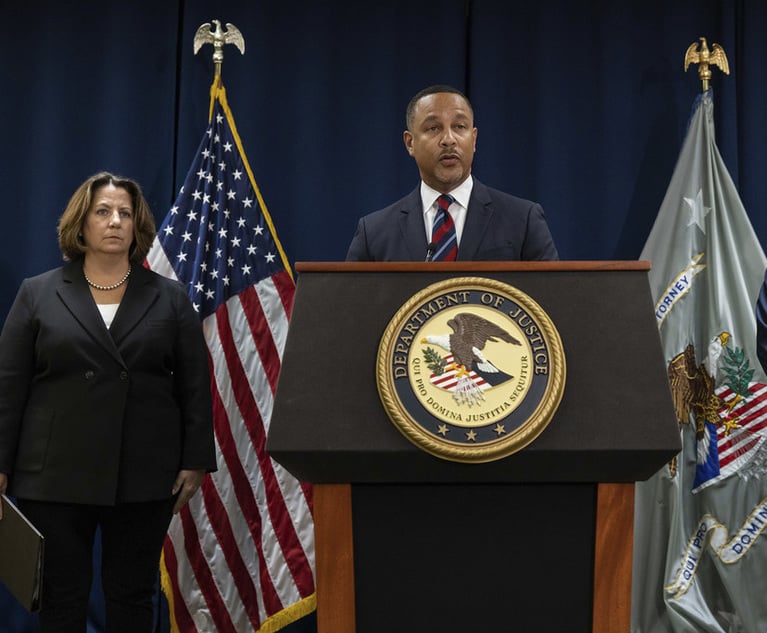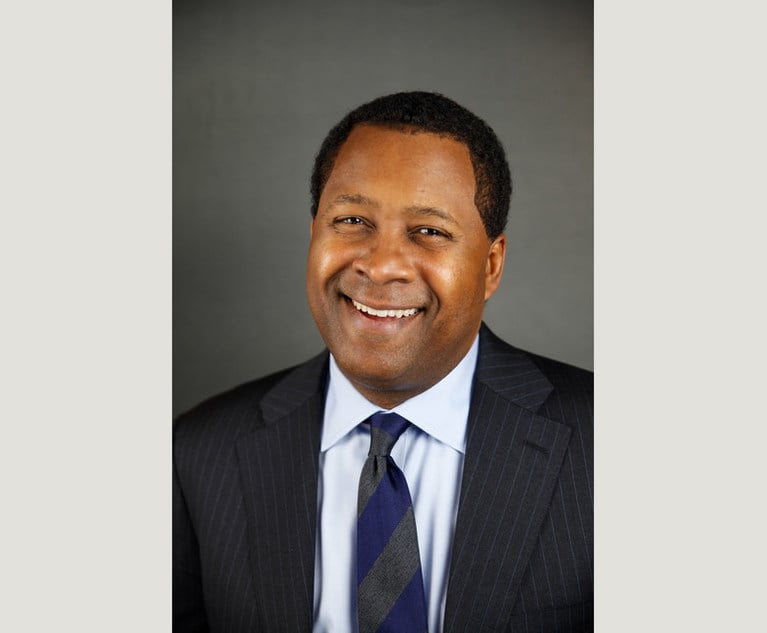Compliance Hot Spots: U.S. Execs Fret About China | Sanctions Drive New Lobbying | New Suit Against FINRA | Who Got the Work & More
The arrest of a Huawei executive in Canada amid escalating trade and diplomatic tensions is keeping international lawyers busy—fielding calls about US executive travel. Plus: our weekly roundup of Who Got the Work and compliance and government affairs headlines that caught our eye. Thanks for reading!
December 18, 2018 at 09:00 PM
10 minute read
Welcome to Compliance Hot Spots, our briefing on compliance, enforcement and government affairs. The arrest of Huawei's chief financial officer is generating buzz in trade and sanctions camps—as American executives raise concerns about travel to China. Plus: the Trump administration's use of sanctions has been a boon to Washington's influence industry—and to Russian lawyers themselves. Scroll down for our weekly roundup of Who Got the Work, and check out some of the latest moves.
Thanks, always, for reading this newsletter—and your feedback is welcome. We're taking a break here until the new year—see you in January! Contact me at [email protected] or 202-828-0315, and follow me on Twitter @cryanbarber.
Trade Lawyers' Phones Are Ringing
American executives and their lawyers have long taken extra precautions traveling abroad, especially in China, where there are heightened concerns about trade secret theft and cyber espionage.
The recent arrest in Canada of a Huawei executive has spurred new concerns, as American executives hit up their lawyers for guidance.
“A month ago, I wouldn't have told an American client to worry about traveling to China. In the immediate aftermath [of the Huawei executive's arrest], however, a client called to say his CFO was scheduled to fly to China the following week and asked for my view. I told him I'd usually say, 'Don't be silly,' but I'm not so sure it's silly anymore,” said Dechert LLP partner Jeremy Zucker, co-chairman of the firm's international trade and government regulation practice.
Other lawyers told me that U.S. company executives have called with concerns about employees stationed in China.
The concern is not entirely abstract: Two Canadians—one a former diplomat, the other a self-fashioned fixer for cultural trips to North Korea—have been arrested in China. So far, no American executive has been detained in the larger dustup between the United States and China.
President Donald Trump has suggested he might be willing to drop the case against Meng Wanzhou, the Huawei executive accused of helping the company evade U.S. sanctions against Iran, in exchange for trade concessions from China.
My colleague Phillip Bantz recently spoke with Richard Matheny, a litigation partner at Goodwin Procter in Washington who heads the firm's global trade practice. Any involvement from Trump in Wanzhou's case would essentially tell the U.S. business community and the world that “everything is for sale. Everything can be negotiated,” Matheny said.
Important to note: “For what it's worth, we've been fielding similar concerns from Chinese clients for some time—dating from before the Huawei executive's recent arrest,” Dechert's Zucker told me. “The Justice Department's recently announced 'China Initiative,' and in particular its prioritization of [Foreign Corrupt Practices Act] enforcement against Chinese companies that compete with U.S. companies, raised a lot of eyebrows.”
>> More reading: A Silicon Valley Dealmaker Sizes Up US-China Trade Tensions
Compliance Headlines: What I'm Reading
>> “As President Trump's administration has increasingly turned to sanctions, travel restrictions and tariffs to punish foreign governments as well as people and companies from abroad, targets of those measures have turned for assistance to Washington's K Street corridor of law, lobbying and public relations firms.” [NYT] Meanwhile, lawyers in Moscow are finding work on the sanctions front. “Clients are asking “Are we dead? Is this the end for us?,” Russian lawyer Ilya Rybalkin told The Wall Street Journal. “So we explain how to soften the blow.” Rybalkin reportedly left Akin Gump Strauss Hauer & Feld after one of his clients appeared on a U.S. sanctions list.
>> America was founded on the promise that every citizen has equal access to the law. Yet in recent years, the Supreme Court has systematically shut the courthouse door to consumers, small businesses and workers, especially by forcing plaintiffs out of court and into mandatory arbitration,” FTC Commissioner Rebecca Slaughter writes in The New York Times. “Apple v. Pepper is yet another instance in which the court will decide whether to keep the courthouse doors open for citizens or to close them before they even get a chance to present their case.” [NYT]
>> “Years of international sanctions against Moscow have hobbled domestic companies and business tycoons and helped push Russia's economy into recession. While the downturn has hit Russian law firms, too, the sanctions have helped some of them to new profits. Sanctions-related legal and consulting work is now a fast-growing business, according to interviews with more than a half-dozen Russian lawyers and experts.” [WSJ]
>> “As the government puts more resources into policing the trading of digital assets, the decline in cryptocurrency prices may well accelerate as those who fear being a target of fraudulent conduct wait for a time when there are greater protections for investors. The question is: Will cryptocurriences survive for long enough for us to ever see that day?” [NYT]
>> “Since Madoff was arrested on Dec. 11, 2008, much has changed at the SEC and how it handles whistleblower information. That is largely because of the SEC whistleblower program Congress created as part of the Dodd-Frank Act in 2010 at the urging of then-SEC Chair Mary Schapiro. Now whistleblowers are welcomed, protected and lauded at the SEC, and whistleblowers have gotten the message.” [Fox Business]
Who Got the Work
>> Reginald Brown and Jamie Gorelick, a powerhouse duo at Wilmer Cutler Pickering Hale and Dorr, helped Google chief executive Sundar Pichai (above) prep for his congressional testimony last week in front of the U.S. House Judiciary Committee. “[A]fter nearly four hours of rambling questions and partisan bickering, Google chief executive Sundar Pichai emerged on Tuesday from his first-ever testimony to Congress almost entirely untouched,” The Washington Post reported. My colleague Caroline Spiezio has more here at Corporate Counsel on Pichai's testimony at the hearing, which spotlighted Google's data-collection practices.
>> Meanwhile, another WilmerHale team helped the Swiss bank UBS resolve a compliance enforcement action; UBS will pay a total of $15 million in penalties to FINRA, the SEC and FinCEN, the agencies announced Monday, for anti-money laundering shortcomings. Kirkland & Ellis partner Kenneth Lench in Washington represented UBS with Fraser Hunter Jr., vice chairman of the securities team at Wilmer Cutler Pickering Hale and Dorr. UBS did not admit or deny the charges. Read the FINRA letter of acceptance here.
>> Speaking of FINRA: The law firm Thompson Hine is counsel to Scottsdale Capital Advisors in a new breach-of-contract suit in Washington against the Financial Industry Regulatory Authority, my colleague Melanie Waddell reports at ThinkAdvisor. “Regulators have elevated the goal of aggressive enforcement over fair and balanced industry representation and collaboration, with one even bragging about pursuing enforcement actions that rival the aggressiveness of the actual regulator, the Securities and Exchange Commission,” Thompson Hine associate Joseph Smith wrote. “Through these actions, FINRA has increasingly taken steps that are contrary to its legal and contractual obligations to its members, and contrary to the interests of its members, critical market participants, and the market itself.” Read the complaint here.
>> No resolution yet for Goldman Sachs: Facing increased pressure over the Malaysia 1MBD financial scandal, the Wall Street titan hired Akin Gump Strauss Hauer & Feld to represent employees who were questioned by federal authorities, The New York Times reports.
>> In other Big Bank news, Covington & Burling successfully represented Deutsche Bank in a civil suit that sought to hold the financial institution liable for a terror attack. The complaint was filed by Gary Osen of Osen LLC; Douglas Dowd of Dowd & Dowd and Tab Turner of Turner & Associates. Read the Seventh Circuit's decision here, and my colleague Jenna Greene has more on the ruling here. The Covington team included partners David Zionts, John Hall and Mark Gimbel.
>> “One of the first startups sued by U.S. regulators over its initial coin offering will pay $2.3 million after being accused of scamming investors through claims such as building a cryptocurrency bank,” the Wall Street Journal reports. The SEC accused AriseBank's then-CEO Jared Rice Sr. and then-COO Stanley Ford “of offering and selling unregistered investments in their purported 'AriseCoin' cryptocurrency by depicting AriseBank as a first-of-its-kind decentralized bank offering a variety of services to retail investors.” Read the SEC's announcement here. Ed Garland at Garland, Samuel & Loeb represented Ford, according to the SEC.
>> New lobbying: Chinese telecom giant ZTE is tapping a deeply connected Washington insider, former Sen. Joe Lieberman, as it tries to fend off ongoing concerns that it poses a threat to U.S. national security,” according to a report in Politico. And more: A team from Brownstein Hyatt Farber Schreck has registered to lobby for San Francisco-based Credit Karma Inc. on “issues related to financial services policy.” The Brownstein team includes Zachary Pfister, senior policy advisor and Russell Sullivan, a shareholder.
Notable Moves & Announcements
>> Former Brownstein Hyatt Farber Schreck lobbyist David Bernhardt is poised to take command of the U.S. Interior Department when Ryan Zinke (above) rides off in the sunset at the end of the year amid an increasing spotlight on ethics. Bernhardt was confirmed last year as deputy secretary. We've got his financial disclosures posted here. Bernhardt “has taken the lead in softening the department's protections for endangered species, a move that will make it easier for oil and gas companies to drill on ecologically sensitive lands.” [Politico]
>> Brian Mahanna, chief of staff and deputy attorney general to New York Attorney General Barbara Underwood, will join Wilmer Cutler Pickering Hale and Dorr as a partner in New York City in February. [Law.com]
>> Jay Jorgensen, Walmart Inc.'s executive vice president and global chief ethics and compliance officer, is leaving the company. He will be replaced by Daniel Trujillo, the company's senior vice president and international chief compliance officer, on Feb. 1.
>> Beveridge & Diamond has hired Josh Van Eaton as a principal in the firm's Washington office. Van Eaton formerly was a senior trial attorney in the U.S. Justice Department's environmental enforcement section of the Environment and Natural Resources Division.
Compliance Hot Spots will take a hiatus for the holiday and return in January. Thanks, always, for reading. Feedback and tips are welcome—or just say hi. I'm at [email protected] or 202-828-0315, and follow me on Twitter @cryanbarber.
This content has been archived. It is available through our partners, LexisNexis® and Bloomberg Law.
To view this content, please continue to their sites.
Not a Lexis Subscriber?
Subscribe Now
Not a Bloomberg Law Subscriber?
Subscribe Now
NOT FOR REPRINT
© 2025 ALM Global, LLC, All Rights Reserved. Request academic re-use from www.copyright.com. All other uses, submit a request to [email protected]. For more information visit Asset & Logo Licensing.
You Might Like
View All
Compliance Hot Spots: GOP Eyes ESG as an Antitrust Issue + Another DOJ Crypto Seizure + Sidley Partner Jumps to Main Justice
9 minute read
Compliance Hot Spots: Lessons from Lafarge + Fraud Section Chief Talks Compliance + Cravath Lands FTC Commissioner
11 minute readTrending Stories
- 1Uber Files RICO Suit Against Plaintiff-Side Firms Alleging Fraudulent Injury Claims
- 2The Law Firm Disrupted: Scrutinizing the Elephant More Than the Mouse
- 3Inherent Diminished Value Damages Unavailable to 3rd-Party Claimants, Court Says
- 4Pa. Defense Firm Sued by Client Over Ex-Eagles Player's $43.5M Med Mal Win
- 5Losses Mount at Morris Manning, but Departing Ex-Chair Stays Bullish About His Old Firm's Future
Who Got The Work
J. Brugh Lower of Gibbons has entered an appearance for industrial equipment supplier Devco Corporation in a pending trademark infringement lawsuit. The suit, accusing the defendant of selling knock-off Graco products, was filed Dec. 18 in New Jersey District Court by Rivkin Radler on behalf of Graco Inc. and Graco Minnesota. The case, assigned to U.S. District Judge Zahid N. Quraishi, is 3:24-cv-11294, Graco Inc. et al v. Devco Corporation.
Who Got The Work
Rebecca Maller-Stein and Kent A. Yalowitz of Arnold & Porter Kaye Scholer have entered their appearances for Hanaco Venture Capital and its executives, Lior Prosor and David Frankel, in a pending securities lawsuit. The action, filed on Dec. 24 in New York Southern District Court by Zell, Aron & Co. on behalf of Goldeneye Advisors, accuses the defendants of negligently and fraudulently managing the plaintiff's $1 million investment. The case, assigned to U.S. District Judge Vernon S. Broderick, is 1:24-cv-09918, Goldeneye Advisors, LLC v. Hanaco Venture Capital, Ltd. et al.
Who Got The Work
Attorneys from A&O Shearman has stepped in as defense counsel for Toronto-Dominion Bank and other defendants in a pending securities class action. The suit, filed Dec. 11 in New York Southern District Court by Bleichmar Fonti & Auld, accuses the defendants of concealing the bank's 'pervasive' deficiencies in regards to its compliance with the Bank Secrecy Act and the quality of its anti-money laundering controls. The case, assigned to U.S. District Judge Arun Subramanian, is 1:24-cv-09445, Gonzalez v. The Toronto-Dominion Bank et al.
Who Got The Work
Crown Castle International, a Pennsylvania company providing shared communications infrastructure, has turned to Luke D. Wolf of Gordon Rees Scully Mansukhani to fend off a pending breach-of-contract lawsuit. The court action, filed Nov. 25 in Michigan Eastern District Court by Hooper Hathaway PC on behalf of The Town Residences LLC, accuses Crown Castle of failing to transfer approximately $30,000 in utility payments from T-Mobile in breach of a roof-top lease and assignment agreement. The case, assigned to U.S. District Judge Susan K. Declercq, is 2:24-cv-13131, The Town Residences LLC v. T-Mobile US, Inc. et al.
Who Got The Work
Wilfred P. Coronato and Daniel M. Schwartz of McCarter & English have stepped in as defense counsel to Electrolux Home Products Inc. in a pending product liability lawsuit. The court action, filed Nov. 26 in New York Eastern District Court by Poulos Lopiccolo PC and Nagel Rice LLP on behalf of David Stern, alleges that the defendant's refrigerators’ drawers and shelving repeatedly break and fall apart within months after purchase. The case, assigned to U.S. District Judge Joan M. Azrack, is 2:24-cv-08204, Stern v. Electrolux Home Products, Inc.
Featured Firms
Law Offices of Gary Martin Hays & Associates, P.C.
(470) 294-1674
Law Offices of Mark E. Salomone
(857) 444-6468
Smith & Hassler
(713) 739-1250














